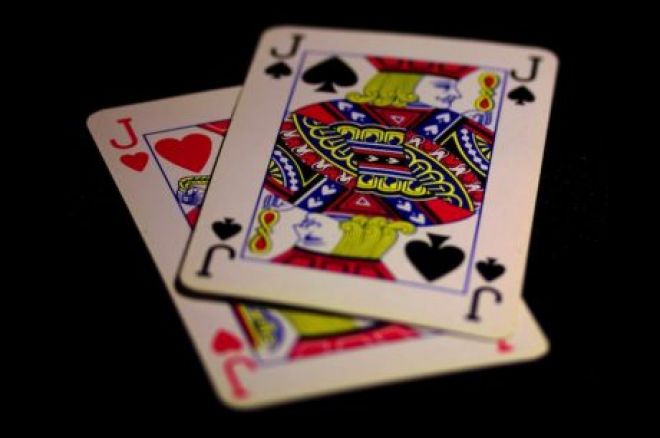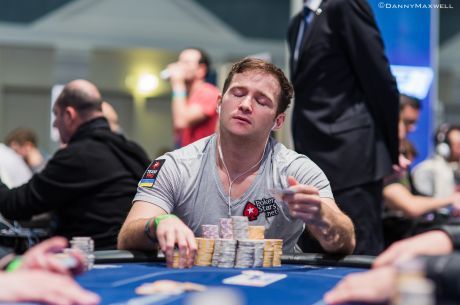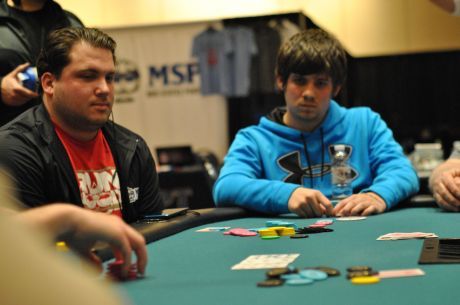Finding Folds Before and After the Flop with Pocket Jacks

We��re saying nothing new when we observe pocket jacks can be one of the most frustrating and difficult hands to play in no-limit hold��em. They aren��t quite a ��premium�� pair like aces, kings, or queens, but they are still big enough to rank as a top starting hand. And as a top source of poker-related pain, too, sometimes.
The two matching paint cards are hard for some to resist overplaying as well, with the ��hooks�� nickname for the hand often explained as not just descriptive of how JxJx appears, but indicative of the way ��fish�� or novice players tend to get themselves ��caught�� in unfortunate situations with the hand.
Before the flop, a pair of jacks rates as the fourth-best starting hand in NLHE, at least in terms of its likelihood to prove the best hand by the river. Only aces, kings, and queens are better, and as the PokerNews Poker Odds Calculator helps us see, a preflop all-in situation between pocket jacks and AxKx-suited shows JxJx almost a 54% favorite to win.
But pocket jacks aren��t always going to be a hand with which you want to commit your entire stack the way you would with AxAx, KxKx, and (often) QxQx. With three higher ranking cards out there, the probability of seeing one of them on the flop when you have pocket jacks is more likely than not as it is about 57% that an ace, king, or queen will fall.
That combination of being both an attractive made hand and one that is especially vulnerable once the community cards begin arriving helps make pocket jacks one of the trickiest hands to play. It also can be especially hard to fold, even those times when you know you should be getting unhooked from your hooks.
Folding Jacks Before the Flop
Some experienced no-limit hold��em players will occasionally regard pocket jacks as a ��small�� pair and play them accordingly, although they will do so with the understanding that jacks are obviously better starters than are middle and lower pairs of lesser value. Jacks have in common with the smaller pairs that likelihood of facing a higher card on the flop, a factor that not only affects how they should be played after the flop, but before as well.
As such, JxJx can sometimes be played like a smaller pair before the flop �� for instance, by calling an opponent��s raise rather than reraising, looking to see flops cheaply with set mining part of the overall preflop approach. What makes jacks different from, say, 5x5x is the fact that flops will sometimes bring three lower cards, meaning the hand doesn��t have to improve to be best.
That said, pocket jacks is most certainly a hand to be open-raising with preflop if given the opportunity, and in most cases the initiative should be continued on the flop as well, even if that higher card arrives. It is not a hand to be played slowly, and taking a pot before the flop or on the flop with aggressive play is always going to be a favorable outcome.
But there will be occasions, though rare, when it actually makes sense to let go of pocket jacks even before the flop arrives.
When facing both a raise and a reraise before the flop, JxJx is often not going to be hand with which you want to get involved. Calling the reraise is sketchy given the possibility of the original raiser coming back over the top, while four-betting is also problematic given the likelihood at least one of other two players has a bigger pair.
It��s worth considering also the relative tightness of your opponents when you hold pocket jacks and they show aggression. Good players sometimes will even abandon JxJx after raising and then being reraised, depending on the opponent and other factors. For example, take a look at this hand from the 2009 World Series of Poker Main Event final table in which Phil Ivey did just that:
Alas for Ivey, in this instance he folded a better starting hand than Antoine Saout��s pocket sevens, but the circumstances were such that he was encouraged to do so. It��s rare to be ready to fold pocket jacks to a single reraise, but if there are multiple players showing aggression before the flop, folding your JxJx can be a recommended play.
Folding Jacks After the Flop
Most postflop hands will be heads-up, and more often than not you will have raised and been called with your JxJx when the flop arrives. As noted above, a continuation bet is generally going to be in order with most flops, although ones containing multiple higher cards to your jacks or being highly coordinated or ��wet�� (three to a straight, three of the same suit) may require caution.
Say a flop comes A?8?2? and your opponent check-calls your continuation bet with JxJx. From there you must evaluate your opponent��s actions carefully, as a leading turn bet will more often than not represent an ace. A check-raise from an opponent on this flop might also warrant a fold, although you��ll want to consider the player��s tendencies if possible (has he ever check-raised without being strong?).
Any higher card to your jacks on the board will invite a careful postflop approach, and a willingness to fold JxJx when facing clear strength is going to be a necessary skill to develop. Take a look at this example of a postflop fold of pocket jacks �� a correct one �� in hand from the 2007 APPT Manila Main Event final table involving Roger Spets and Nicholas Bamman. There��s some intriguing chatter between the players in this hand, too, with Daniel Negreanu providing helpful commentary as well:
In this hand both players were perhaps guilty of some loose table talk, with Spets revealing something about his hand postflop and Bamman in turn revealing his spot-on read of Spets��s holding. Spets makes a good fold, however, as Negreanu points out, upon recognizing both from Bamman��s talk and betting that his JxJx was likely beaten.
The most difficult postflop fold of JxJx comes when the board brings no higher cards, in which case your read of the opponent is going to be crucial to deciding how to continue. Say you c-bet with your jacks on a 9?5?3? flop and your opponent raises you. You have to decide �� taking previous hands and the preflop action into account �� if he has a higher pair or set and proceed accordingly. Calling that reraise might be fine on the flop, but further aggression afterwards might warrant letting go of your pretty pair.
There��s a lot more to playing pocket jacks successfully in no-limit hold��em, of course. But in order to play JxJx profitably, it��s important to know that folding the hand will sometimes be necessary.
Photo: ��A Pair of Jacks,�� PhotoGraham. Creative Commons Attribution ShareAlike 2.0 Generic.
Get all the latest PokerNews updates on your social media outlets. Follow us on Twitter and find us on both Facebook and Google+!








